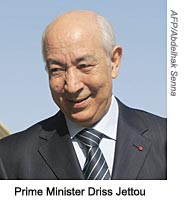Casablanca, Morocco, April 6, 2007—A delegation from the Committee to Protect Journalists voiced concern today about a troubling pattern of punitive judicial sanctions that have threatened Morocco’s independent press.
Over the last two years, Moroccan courts have levied stiff criminal penalties and civil damages against independent news publications, effectively banishing two of the country’s most outspoken journalists from their profession, pressuring a third to quit journalism, and sending a strong message to independent-minded journalists who report on sensitive political issues in the kingdom. Moroccan officials and members of the press are also discussing amendments to the country’s press law that would keep in place tough criminal penalties and possibly open the door to new restrictions on the news media.
“These recent cases threaten not only Morocco’s international reputation as an oasis of relative press freedom, but the quality and integrity of its national conversation,” CPJ board member and Al-Jazeera English anchor Dave Marash said. Marash, a member of the delegation, took part in a press conference today that concluded CPJ’s nine-day mission to Casablanca and Rabat.
This week, CPJ met with Moroccan editors, reporters, publishers, heads of local human rights groups, and members of the government, including Prime Minister Driss Jettou, Information Minister Nabil Benabdullah, and parliament Speaker Abdel Wahid al-Radi, to discuss the country’s press freedom climate.
During meetings with Moroccan officials, the CPJ delegation expressed concern about several recent court judgments that appear designed to pressure or financially cripple some of the country’s most outspoken independent publications. They include:
• Aboubakr Jamaï and Fahd al-Iraqi, Le Journal Hebdomadaire. In April 2006, the Rabat Court of Appeals upheld record damages against the independent newsweekly Le Journal Hebdomadaire in a defamation suit brought by Claude Moniquet, head of the Brussels-based European Strategic Intelligence and Security Center. A lower court had awarded 3 million dirhams (US$359,700) in damages to Moniquet, who said Le Journal Hebdomadaire had defamed him in a six-page critique questioning the independence of his think tank’s report on the disputed Western Sahara, which was annexed by Morocco three decades ago. The damages were the largest ever for a press defamation suit in Morocco, according to Moroccan journalists. Jamaï’s lawyers were prevented from calling expert witnesses, and the judge never provided an explanation for how he arrived at the extensive damages. Jamaï stepped down as publisher of the magazine earlier this year to prevent authorities from seizing its assets. He has since left the country, citing an inability to pay the fine or to work since authorities will seize his future income.
• Ali Lmrabet. In April 2005, a Moroccan court convicted independent journalist Ali Lmrabet of defaming a previously unknown group called the Association of Relatives of Saharawi Victims of Repression and banned him from working as a journalist for 10 years. The group sued after Lmrabet wrote an article for the Madrid-based daily El Mundo that referred to the Saharawi people in the Algerian city of Tindouf as refugees, contradicting the Moroccan government’s position that they are prisoners of the rebel Polisario Front. The Polisario, which is fighting for the disputed Western Sahara, operates mostly out of Algeria. Although neither the association nor its spokesman, Ahmed Khier, who initiated the case, was mentioned in the article, the criminal court convicted Lmrabet.
The record damages against Le Journal Hebdomadaire were preceded in 2005 and 2006 by two judgments of 835,000 dirhams (US$100,000) apiece against the independent weekly TelQuel. The plaintiffs later waived payment.
“The record shows that Moroccan courts are influenced by the government,” said Joel Campagna, who led the delegation as CPJ’s senior program coordinator for the Middle East and North Africa. “It’s clear to us that authorities are putting economic pressure on critical newspapers by exacting exorbitant civil damages in the courts.” These cases have, in some instances, prompted news outlets to soften coverage, CPJ research has found.
Criminal prosecutions also threaten members of the independent press. On April 17, a court is expected to rule in the case of Abdelaziz Koukas, publisher and editor of the independent weekly Al-Ousbouiya al-Jadida, who faces charges of defaming the monarchy. Koukas published a June 2005 front-page interview with Nadia Yassine, the daughter of Sheikh Abdal-Salam Yassine, head of the outlawed Islamist organization Justice and Charity. Yassine criticized the monarchy, a constitutional offense, and said Morocco would fare better as a republic. Koukas faces three to five years in prison and a fine of up to 100,000 dirhams (US$11,800). The weekly faces possible closure.
Many of the recent press prosecutions underscore the restrictions imposed by Morocco’s 2002 press law, which lays out a variety of potential penalties. A draft press law now under discussion among publishers, journalists, and the government would keep several criminal penalties in place for journalists deemed to have violated vaguely worded bans against offending the monarchy, Islam, and state institutions such as the army and judiciary. Offenders would face the prospect of jail and heavy fines for violating the content bans, which also include critical coverage of the country’s sovereignty over Western Sahara.
The new draft law would also stipulate the creation of a National Press Council whose 15 members would be appointed by the king, journalists, and publishers. One draft version of the amendments grants the council sweeping powers to ban journalists from working in their profession, and levy economic sanctions against newspapers journalists who violated a prospective ethics code. Moroccan Journalist Syndicate head Younes Mujahid told CPJ that the most recent draft has excised these provisions. Both he and Moroccan officials told CPJ that the drafting of the amendments continues and is open to improvement.
“Drafting a new press law is an opportunity for Morocco to decriminalize sanctions against journalists and implement internationally recognized civil remedies for defamation or journalistic error,” Marash said. “It is chance to renew Morocco’s dedication to freedom of speech and access to ideas, opinions, and information.”
Kamel Labidi, CPJ’s Middle East and North Africa program consultant, also took part in the mission.
